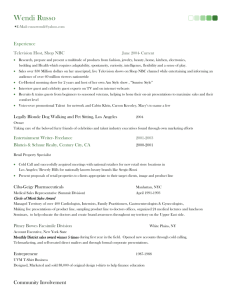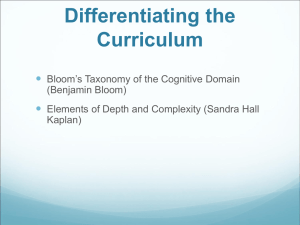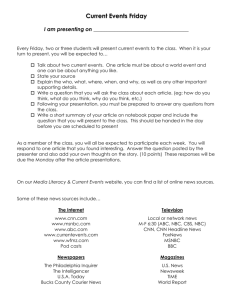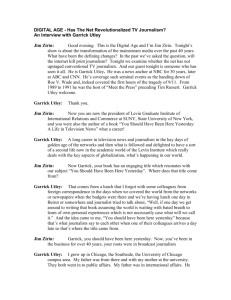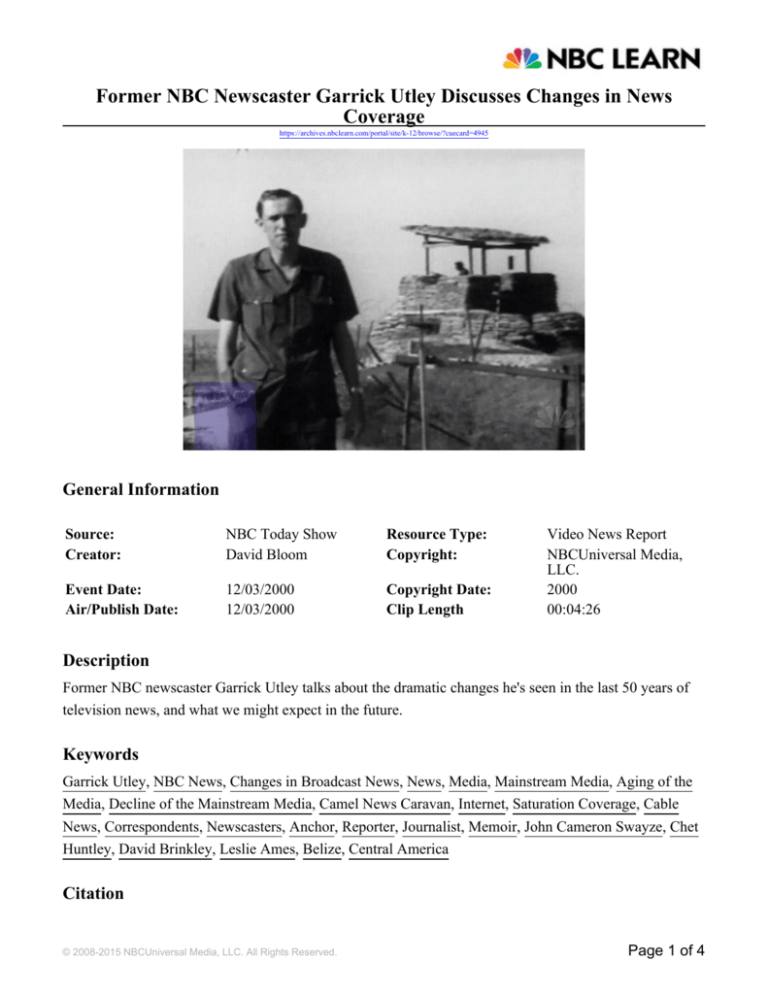
Former NBC Newscaster Garrick Utley Discusses Changes in News
Coverage
https://archives.nbclearn.com/portal/site/k-12/browse/?cuecard=4945
General Information
Source:
Creator:
NBC Today Show
David Bloom
Resource Type:
Copyright:
Event Date:
Air/Publish Date:
12/03/2000
12/03/2000
Copyright Date:
Clip Length
Video News Report
NBCUniversal Media,
LLC.
2000
00:04:26
Description
Former NBC newscaster Garrick Utley talks about the dramatic changes he's seen in the last 50 years of
television news, and what we might expect in the future.
Keywords
Garrick Utley, NBC News, Changes in Broadcast News, News, Media, Mainstream Media, Aging of the
Media, Decline of the Mainstream Media, Camel News Caravan, Internet, Saturation Coverage, Cable
News, Correspondents, Newscasters, Anchor, Reporter, Journalist, Memoir, John Cameron Swayze, Chet
Huntley, David Brinkley, Leslie Ames, Belize, Central America
Citation
© 2008-2015 NBCUniversal Media, LLC. All Rights Reserved.
Page 1 of 4
MLA
"Former NBC Newscaster Garrick Utley Discusses Changes in News Coverage." David Bloom,
correspondent. NBC Today Show. NBCUniversal Media. 3 Dec. 2000. NBC Learn. Web. 16 April 2015
APA
Bloom, D. (Reporter). 2000, December 3. Former NBC Newscaster Garrick Utley Discusses Changes in
News Coverage. [Television series episode]. NBC Today Show. Retrieved from
https://archives.nbclearn.com/portal/site/k-12/browse/?cuecard=4945
CHICAGO MANUAL OF STYLE
"Former NBC Newscaster Garrick Utley Discusses Changes in News Coverage" NBC Today Show, New
York, NY: NBC Universal, 12/03/2000. Accessed Thu Apr 16 2015 from NBC Learn:
https://archives.nbclearn.com/portal/site/k-12/browse/?cuecard=4945
Transcript
Former NBC Newscaster Garrick Utley Discusses Changes in News Coverage
DAVID BLOOM, co-host:
In this information age, it's breathtaking to think about how dramatically television news has changed
over the past 50 years, from those early newscasts in grainy black and white film to 24-hour cable news,
and now live broadcasts on the Internet. It wasn't all that long ago when television news looked like this.
(Footage from several early news broadcasts shown)
BLOOM: Garrick Utley was a young NBC reporter in 1964. Today he reports for CNN and he has a new
book and CD-ROM, "You Should Have Been Here Yesterday."
Good morning, Garrick, great to see you.
Mr. GARRICK UTLEY ("You Should Have Been Here Yesterday"): Great to see you, and see that skinny
kid there, about 35 years ago in the Mekong Delta. Long time.
BLOOM: Well, that skinny kid is now grown up and he's written a memoir. But it's not merely not a
memoir, right? It's a book not just about television's past but about television's future.
Mr. UTLEY: Well, I was very fortunate here at NBC. I was 23 years old when I was hired by NBC, and
that was just a few weeks before the start of the half-hour network newscasts at NBC and CBS. That was
really the start of the network news as we know it today and have done it for the past several decades. So I
was able to ride that whole arc of television news. But my parents were in news in the late 1940s, early
'50s.
BLOOM: Your dad was a radio broadcaster.
Mr. UTLEY: Radio and television commentator. My mother also worked in the field. And so I started at
the age of seven or eight understanding the Camel News Caravan and being part of that. So it's as much
the history as well as my personal experience.
BLOOM: There's a great story that you tell at the beginning of the book about showing up at your dad's
© 2008-2015 NBCUniversal Media, LLC. All Rights Reserved.
Page 2 of 4
studio and thinking that Aunt Jemima would be there, because, of course...
Mr. UTLEY: I was...
BLOOM: ...she was sponsoring the show.
Mr. UTLEY: Actually, it was a five-minute newscast in the morning. I wanted to go down, my dad took
me to the office, takes the kid to work. And I didn't dare tell him I really wanted to see the studio to meet
Aunt Jemima. And I was in the studio at 8 AM in the morning, and no Aunt Jemima. And suddenly the
door opens and here comes a skinny white woman, an actress, who sits down in front of the microphone,
speaks with a very thick, southern, African-American accent. It was my first disillusionment about the
power of broadcasting.
BLOOM: Well, tell me about the years since. I mean, you--we were talking about this earlier. You're not
one of these guys who wrings his hands for the good old days, right?
Mr. UTLEY: Not at all. People ask, `Oh, was there a golden age?' In a certain way there was. But was the
news coverage better then? I don't think so. There were just a couple of networks, as hard as we worked at
it. Today when you add up Internet and all the cable news channels, the magazines and the newspapers
out there, we have much greater access to news and information. It's a much richer treasure we can draw
from. So I don't weep for the good old days. It was great fun, but look at what we have today.
On the other hand, we have to exercise discipline and really be editors today, because there is so much
noise out there. It puts more of a burden on us. We can't just be the passive recipient of news the way we
were in the past.
BLOOM: And one of the points that you make is about the technology of the business changing so
dramatically, and you point to this trip that you took to Belize as an example, right?
Mr. UTLEY: A producer, Joe DeCola, who still works on the show...
BLOOM: Sure.
Mr. UTLEY: ...and I went down there in the 1980s, because I wanted to see what happens to a country
where there's no television itself, and yet people can start to bring in television signals, steal them via
satellite. So we went to Belize in Central America and we did this report.
(Video footage shown, Mr. Utley narrates)
Mr. UTLEY: And there it is down there, near Guatemala. And this was Leslie Aames. And he put up a
satellite in this backyard and started sending pictures of programs on four channels out to his community.
And here's what they heard.
(Audio of intro to "The Tonight Show")
BLOOM: So they have no television there at all.
Mr. UTLEY: They had no TV there, but imagine the impact in this small village without even any
electricity. They ran that television off a car battery. And here was Johnny Carson and here were all the
commercials, American prosperity, coming into this community. We don't have a global village yet, but
we have villages, including that little one, San Ignacio in Belize, linked to all the other villages by satellite
today.
BLOOM: One of your concerns is, of course, about the commercialization of this business. But we have
another clip which shows us that it wasn't merely now but also back then when those were concerns,
© 2008-2015 NBCUniversal Media, LLC. All Rights Reserved.
Page 3 of 4
right?
Mr. UTLEY: We may be going back to the future with the Camel News Caravan. This is December, 1950,
shortly before Christmas, and look at this.
(File footage shown of news clip)
BLOOM: Hopefully neither one of us will be doing that any time soon.
Mr. UTLEY: Well, hopefully not. But who knows? We're in this very new era right now, there's such a
strong market, pressures to compete and get those ratings and get the income coming in. Who knows
where we're going to end up?
BLOOM: Garrick Utley, so good to see you.
Mr. UTLEY: Thank you, David.
© 2008-2015 NBCUniversal Media, LLC. All Rights Reserved.
Page 4 of 4



